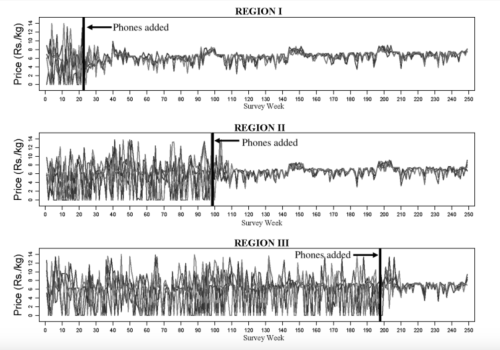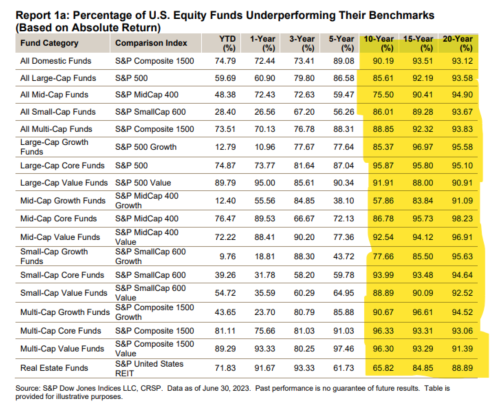
We sometimes hear financial pundits describe index fund investing as settling for average. If you’re happy with average returns, they say, go ahead and index. The implication is that, if you really want to outperform, you need to use an actively managed fund.
But, as BEN CARSON explains, indexing is anything but settling for average. It’s a way of ensuring, in the long run, that you’ll outperform most of your peers.
Kerala is a coastal state in India with a large fishing industry.
Beginning in 1997, mobile phones were introduced to the region. By 2001 more than 60% of the fishers and traders were using phones to coordinate sales and set prices for the fish.
Robert Jensen used data from this market in a research paper called The Digital Provide to show how the addition of more information impacted fish prices in the marketplace.
You can see the timing of the rollout of cell towers by different sections of the region (the circles show the radius of the cell towers for phone coverage):

Spread of mobile phone coverage in Kerala
Before information was easily accessible, there was a high degree of price dispersion. That dispersion fell in short order once information became plentiful:

Prices and mobile service in Kerala
More information led to a more functional market for both suppliers and consumers. Profits increased and consumers experienced far less volatility in the price of the fish they were eating. Plus there were fewer fish going to waste.
Everybody wins.
More information makes markets more efficient in a hurry.
After reading about the Kerala fishing industry, I couldn’t help but think of the stock market.
Don’t get me wrong — the stock market is still quite volatile, even in the information age. Since the internet became a part our lives in the 1990s we’ve experienced plenty of crashes, bear markets and volatility.
The stock market still isn’t perfectly efficient by any means. There are still wild swings in both the market and the individual securities that make it up.
But there are fewer and fewer informational advantages today because information is so readily available to every investor. It becomes harder to outperform in a world with more information for all investors. Since Reg FD was introduced, alpha in the hedge fund space has all but vanished.1
You could also make the claim that the past couple of decades has been one of the hardest environments ever to outperform.
Just look at the long-term performance numbers for active fund managers on the latest US SPIVA report:

It’s basically been impossible to outperform over the past 10-20 years across equity fund categories.
The index fund debate was settled long ago, but looking at these numbers through the lens of “average” returns is interesting. Yes indexing gives you the market’s average return, but the average return for active fund managers, net of fees, is almost always lower than the benchmark.
Indexing doesn’t provide you median returns. Over longer time frames, it almost guarantees you’ll end up in the top quartile or decile of performance.
Owning index funds has always been a winning strategy when it comes to outperforming professional investor for the simple fact that active investors are the market. When you net out their higher-than-index fund fees, they have to underperform, collectively.
Sure, some will outperform but the odds of you picking those active managers ahead of time are slim. The information age has made it even harder to outperform because there are fewer informational advantages. And the fact that so many retail investors are now choosing to index, means there are fewer suckers at the poker table — it’s pros competing against pros, which makes for a more difficult game.
The good news for individual investors is you don’t have to compete against professionals. You can take a low cost, longer-term approach and beat the pros.
The hardest part for most people is keeping that long-term mindset so you don’t underperform the funds you own by making behavioural mistakes when markets inevitably go haywire.
ABOUT THE AUTHOR
BEN CARLSON is Director of Institutional Asset Management at Ritholtz Wealth Management. He’s the author of four books, including Invest Your Way to Financial Freedom, which he co-authored with TEBI founder Robin Powell.
PREVIOUSLY ON TEBI
Overcome your fear of the stock market
Where the Dumb Money movie falls down
There’s hope yet for St James’s Place
THE TEBI YOUTUBE CHANNEL
Have you visited the TEBI YouTube channel lately? There’s already a wide selection of high-quality videos on there. Why not subscribe and be one of the first to see our latest content? You’ll also find our videos on Instagram and TikTok.
© The Evidence-Based Investor MMXXIII









